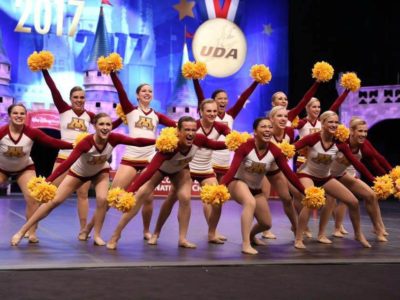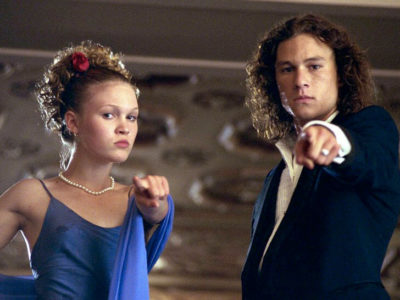Get the latest ranking of Top 10 Schools for Aspiring Writers 2018 here.
[woobox offer=’tuafxp’]
What will you do with a creative writing major? Prepare for the skeptics—a creative writing major is not for the faint of heart. If you’re serious about your craft, you’ll need a creative writing program that will whip your writing into shape. We’ve uncovered programs with reputable alumni and faculty, scholarship opportunities, inventive writing courses and thriving literary magazines. We’re talking programs so exclusive they often require a manuscript application. No school can guarantee you’ll be the next great American author, but these ten will get you pretty damn close.
10. EMORY UNIVERSITY
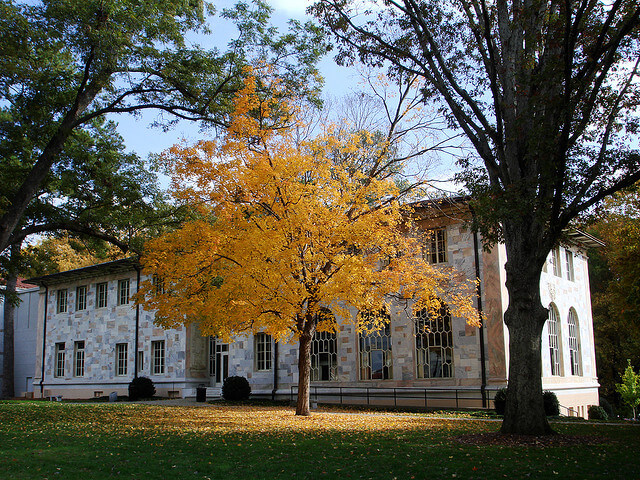
You better gear up if you’re looking into the creative writing program at Emory University in Atlanta. On top of a standard application requiring reasons for applying to the program, students must submit a manuscript to secure a spot in the advanced poetry and prose courses. The select few who do get accepted can apply for the Grace Abernethy Scholarship just for being a creative writing major. If you decide to pursue playwriting, you’ll thrive with Emory’s unique joint Theater Studies major. See ya on Broadway.
9. COLUMBIA UNIVERSITY

Imagine writing for Quarto, the same literary magazine that once featured J.D. Salinger. Edwidge Danticat and poet Louise Gluck also top the list of notable formerQuarto contributors. Columbia’s program cultivated Pulitzer Prize winners, Poet Laureates and notable authors such as Mitch Albom, Langston Hughes, Jack Kerouac and Patricia McCormick. Prepare to join an alumni network of stars.
8. UNIVERSITY OF VIRGINIA
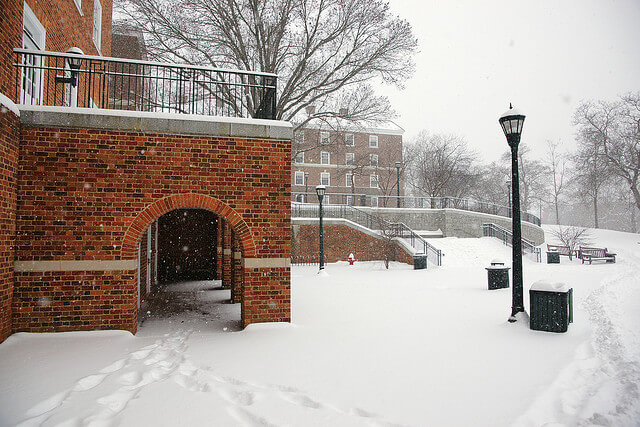
Have you ever heard of a literary magazine for medical students? Doubtful. University of Virginia in Charlottesville goes above and beyond the traditional literary magazine with themed publications in humor, sports satire, female experience, Asian American culture and medical student literature. Who knows, you may discover your inner comic with all these opportunities to write. UVA boasts famous screenwriter alums such as Tina Fey, plus Pulitzer Prize winners and authors such as Claudia Emerson and Henry S. Taylor.
Not to mention, the poetry workshops can’t be beat. “The workshops both improve writing skills and expose you to many different styles through interactions with the other members of the class,” said Ben Ford, an English major at UVA.
7. NEW YORK UNIVERSITY

Learn from the best. New York University’s Master Classes program offers fiction, poetry and creative nonfiction courses taught by famous writers. There is one condition: a manuscript submission. The work will pay off though; learning from the best of the best, such as Zadie Smith and Eileen Myles, will transform your writing from amateur to advanced. NYU encourages studying abroad with its creative writing courses in Florence, Paris and New York, with full immersion and seminars featuring famous writers.
6. OBERLIN COLLEGE
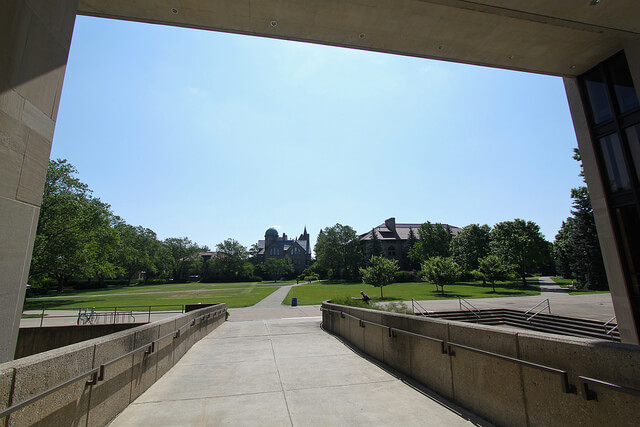
If you’re looking for your creative writing niche, start with Oberlin College in Ohio. Classes cover the usual poetry, fiction and nonfiction topics, but you can also take classes in translation, screenwriting, short stories and travel writing. If you’ve already found your inner poet, however, let it be known that Oberlin’s Emma Howell Poetry Prize will award you $1000.
5. WASHINGTON UNIVERSITY
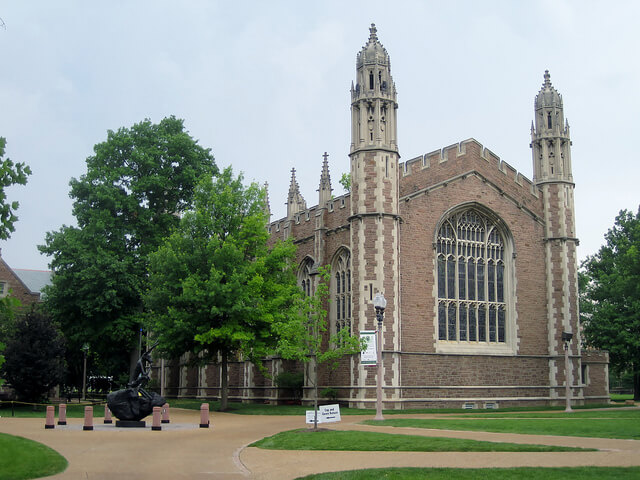
Why not reap the rewards of your creativity? You deserve it. Washington University in St. Louis awards up to eleven scholarships to creative writers. Washington U classes cover a vast variety of creative writing styles, such as historical fiction, rewriting poetry, memoirs, microfiction, cultural identity and medicine. Scholarships coupled with building on the creative writing sector of your choice means more bang for your buck.
4. BROWN UNIVERSITY
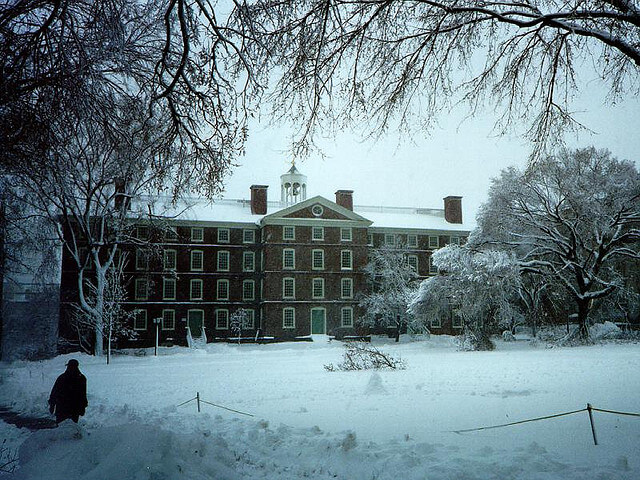
If you know you want to pursue screenwriting, secure your seat at Brown University in Providence. Brown’s already impressive alumni network flaunts a remarkable number of screenwriters and playwrights, including Josh Friedman (War of the Worlds), Mark Heyman (Black Swan), John Krasinski (who knew the cutie from The Office studied playwriting?), Academy Award winner Kurt Luedtke, (Out of Africa), Emmy Award winner Robin Green (The Sopranos) and Pulitzer Prize-winning playwrights. Add in a full range of screenwriting classes and prepare for the big screen.
3. JOHNS HOPKINS UNIVERSITY
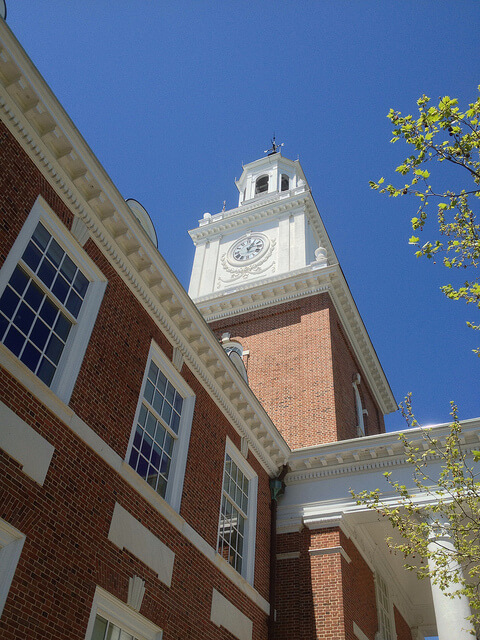
Seminars at Johns Hopkins University in Baltimore dig deep. You can choose from a selection of forty classes on setting the scene, outdoor stories, nature writing, science writing and point of view. To build on your seminar experience, join JHU’s literary magazine, Thoroughfare. The publication’s impressive website will encourage you to submit pieces and read peers’ work.
2. UNIVERSITY OF TEXAS
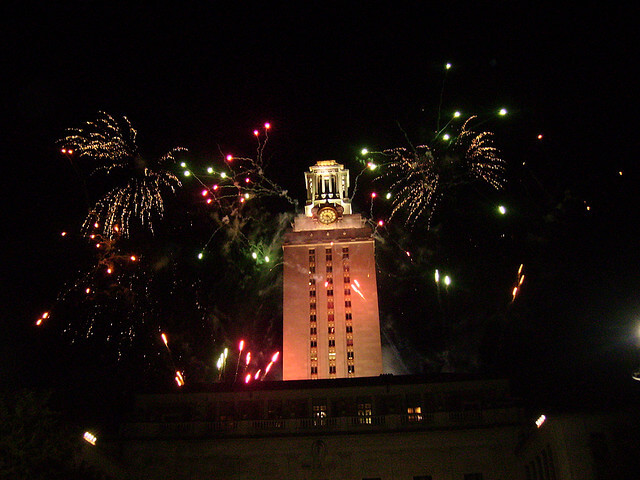
Just to be accepted into the creative writing program at University of Texas in Austin, you must already have completed English prerequisites, met the GPA requirement of 3.33 and submitted an essay with a general application. Talk about competitive. UT features in-depth classes for those studying playwriting and screenwriting, such as narrative structure for television and film and theatre history. Alumni authors include Nobel Prize winner J.M. Coetzee and Rick Riordan (Percy Jackson & the Olympians).
Editor-in-chief Rachel Abbott of UT’s literary magazine, Analecta, digs the program, especially the first class of the fiction track. “I liked that it challenged me to write longer pieces than ever before, and the workshop setting gave me the confidence to share my writing with others,” she said. She’s looking forward to advancing her fiction skills, while also experimenting with poetry or screen writing.
1. UNIVERSITY OF IOWA

No other school compares to the creative writing program at University of Iowa in Iowa City, starting with the rigorous admissions process. UI requires a strict GPA limit of 3.33, portfolio submission and prior coursework. Writing courses cover just about every niche imaginable: business, culture, the environment, science, social change, sports and humor. A lengthy list of scholarships makes the possibility of traveling the path of Pulitzer Prize winners and Poet Laureates— Rita Dove, Tennessee Williams, Tracy Kidder and Robert Hass— even more of a reality.
Student Leslie Caton, intern for The Iowa Review, took full advantage of UI’s extensive creative writing program. In just her first she she attended a Q&A for students with essayist Phillip Lopate, voted on the Essay Prize in a class taught by Nonfiction Writing Program director John D’Agata, and learned how to inhabit, interview and write about others in an Immersion Writing course. “Being part of a community of such talented writers, teachers and students keeps me excited about writing and pushes me to improve my craft,” she said.
For the full list check out our blog on HuffPost College.
Related Read: Attention, Writers: 3 Books You Need to Read
What You’ll Actually Learn at the Best Creative Writing Programs
Written by Macey Spensley
You’ve already realized that med school just is not for you – now you have to convince your parents to pay for your MFA in Creative Writing. They might tell you that you cannot make a living being a writer. But an MFA in Writing will go beyond just writing a novel. You’ll pick up these concrete and valuable skills at these killer writing universities.
1. How to write for Broadway

Do you have dreams of writing the perfect drama queen for Rachel Berry to portray in her first Broadway appearance? Emory University wants to help you achieve that dream. With a joint playwriting major, Emory University dedicates much of its resources to helping students develop play scripts. Students hold the Lenaia Festival each year, which allows student plays-in-progress to be shown and critiqued. And with the Creative Writing Reading Series underway, students can meet with and learn from nationally and internationally recognized playwrights.
2. How to truly Master the Fine Arts

Why stop at being the next Hemingway, when you could be the next Spike Lee or Michaelangelo, too? Attending the writing program at the Columbia University School of the Arts offers students a unique opportunity to witness how the arts intersect each other. Other sections of the School of the Arts, like film, theatre and visual arts, enrich the experience of those in the writing program. The administration encourages students to take classes outside of the writing program as electives to combine skills and prepare themselves for writing in any industry. In addition, Columbia offers the Literary Translation at Columbia program. Here, students learn about the art of translation as a literary work. You can finally put those four years of Spanish class from high school to use.
3. How to save money

Mo’ money, mo’ problems? Not at the University of Virginia. The school awards all students in the workshop the same amount of funding. They also don’t have to compete for that funding again in their second year. Nobody will wonder why Jane in their fiction class got more money than them when her short story bore them to sleep, and it fosters a sense of respect and companionship within the workshop. Students don’t teach their first year, which allows them to put all of that energy into writing. When they do begin to teach, they design courses themselves rather than teaching a discussion section. The ability to teach others in the way they want will ultimately allow students to learn more, themselves. Even the experts in the MFA courses can never acquire enough knowledge.
4. What the real experts know

Alicia Keys didn’t lie when she said NYC is what dreams are made of. New York City bubbles over with opportunities no matter what profession you want to enter, and that includes the literary world. Famous writers have found their niche in the Big Apple, and have turned to NYU to pass along those skills to their students. Some of these famous faculty members include poets Ocean Vuong and Anne Carson. The primarily workshop based classes at NYU will help you in learning to both give and receive criticism. “I’ve learned to be a constructive critic of my peers’ work, as well as how to receive criticism while remaining true to my own voice,” said junior Meghan Bennett. “With the encouragement of my teachers I’ve learned to take risks in my fiction and poetry writing, and be unafraid to share them.”
5. Beowulf Who?

Everyone wants to write as famously as Shakespeare, but who actually wants to read him? At Oberlin College, they won’t force you to take those boring literature classes along with your exciting novel-writing workshop. The Creative Writing major at Oberlin stands separate from the English department, and has been that way for 40 years. “Faculty and students work independently to tailor the concentration to the needs of the majors and of all students interested in creative writing,” said Associate Professor of English and Acting Director of Creative Writing DeSales Harrison. “Students are encouraged constantly to test, refine and transcend their skills in the conception, construction and revision of creative work.” You can spend all of that energy you might have put into translating Chaucer on your short story repertoire.
6. How to Get published

Want to know what it takes to get your short story about finding love while coming of age pass the slush pile? Washington University offers a unique opportunity for you. Dorothy, a publishing project, calls Washington U home. The press publishes work by women. Students have the opportunity to apply to become an editorial assistant at Dorothy in their second year of the MFA program. The internship provides students the ability to learn a mix of literary publishing skills, such as editorial work and marketing. “You just learn a whole lot about the publishing industry if you work at Dorothy,” said Hurst Senior Writer in Residence Kathryn Davis. “Washington University offers a sizeable stipend, so you won’t go into debt while learning here.”
7. How to Survive in the Tech World

The print book might not have died yet, but Brown University will prepare you for the potential demise. In response to this increasing technological world, Brown hosts the Digital Language Arts program within the Creative Writing MFA. Students in this program work with multiple different media while still focusing on how writing and language are used to communicate ideas. Brown University websites states that some of the media students can study are “aesthetic computation, creative hacking, computer graphics, animation, electronic music and sound art, digital video and even artificial 3D audiovisual environments.” When a hologram pops out of your electronic book to demonstrate a scene in thirty years, you can probably thank a Brown student.
8. Idiomas Nuevos

John Hopkins University believes in the power of language so much that they want you to learn two. The school requires an intermediate level of knowledge in a second language to “allow a writer the flexibility to experiment with the first language,” as their website states. Students can either pass a placement exam or translation test to show their proficiency in their second language, or can enroll in any level in any language. Readers all over the world will have no problem picking up your work after you leave John Hopkins.
9. The Art of Revision

Students at the University of Texas don’t slack off. Here, the MFA program is three years long instead of the typical two. Only five or six fiction writers gain acceptance each year. Students choose a primary field of study, like fiction and poetry, and typically have a secondary area of study as well. The faculty constantly pushes revising and revising and revising on their students. The industry expects this of writers as well, so this won’t shock you when you graduate and head into the big bad world of literary publishing. The school encourages students to try out another genre of writing with their excess credit hour allowances. The University of Texas will have you prepared for the 3 a.m. binge-writing sessions while ingesting copious amounts of Red Bull that are probably in your future.
10. How to become the publisher

If you mention living in Iowa, people might ask “Oh, the corn state?” But if you mention living in Iowa City, they’ll know you live in one of the literary capitols of America. Iowa City stands as the only UNESCO City of Literature in the United States, and that brings many unique opportunities to students who study here. The renowned Prairie Lights Bookstore attracts writers of all kinds to read during their book tours. Each year, Iowa City holds the Mission Creek Festival. Authors from all over the world come to Mission Creek to read their work and speak on panels. On top of the opportunities to network with famous agents and authors, the University of Iowa has a literary publishing track. Undergrad students get to create their own literary magazine and chapbooks by soliciting and editing submissions, designing the physical copies and marketing them to the community. You won’t have to desperately reach for experience on job interviews when you graduated as a Hawkeye.
[woobox offer=’tor6do’]
Bring your passion for words to your dorm room with the writer collection:

If you love to write, and you want to focus your college career on perfecting your craft, consider the following majors:
- English Major
- Communication Studies Major
- Languages and Literature Major
- Creative Writing Major
- Journalism Major
- Public Relations Major
- Marketing Major
In each of these majors you will flex your writing skills. Tired of just hearing “show vs tell” and ready to start showing? Consider the creative writing or fiction writing path. There you’ll learn the art of developing characters and writing short stories, plays, poems and novels. The English and languages and literature majors focus on analyzing novels, nonfiction and varying forms of literature. Whereas in journalism, you’ll improve your ability to connect with sources and report on news and events. As for marketing, public relations and communication studies, you’ll learn to use the written word as a promotional tool. Each major connects to specific career paths, however all majors emphasize writing, an invaluable skill for any job. Research each major and follow your heart, or in this case, your pen.
Every writer’s journey involves mentors and guides along the way. As an aspiring writer, these three books will keep you company on the winding road ahead. Add these key resources to your growing library.
On Writing Well
by William Zinsser


On Writing: A Memoir Of The Craft
By Stephen King


The Writing Life
by Annie Dillard
At College Magazine we’re always seeking talented student writers to join our team and get published. We have an entire training program dedicated to helping aspiring writers uncover their voice. We tackle the following common writing habits:
- Conversational writing versus formal writing
- Concision
- Active vs passive voice
- Repetition
- Sentence length variation
- Show versus tell
If you’re interested in applying, send your resume and writing sample to [email protected].
For More College Rankings
The 10 Best Colleges for Career Services
*Updated April 6, 2016 to include information on majors focused on writing and helpful resources for aspiring writers.
**Updated on February 19, 2018 to include “What You’ll Actually Learn at the Best Creative Writing Programs” by Macey Spensley
[woobox offer=’tor6do’]












